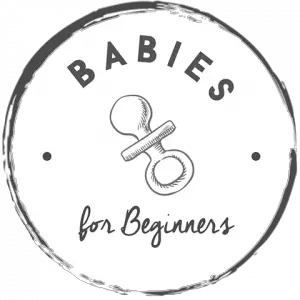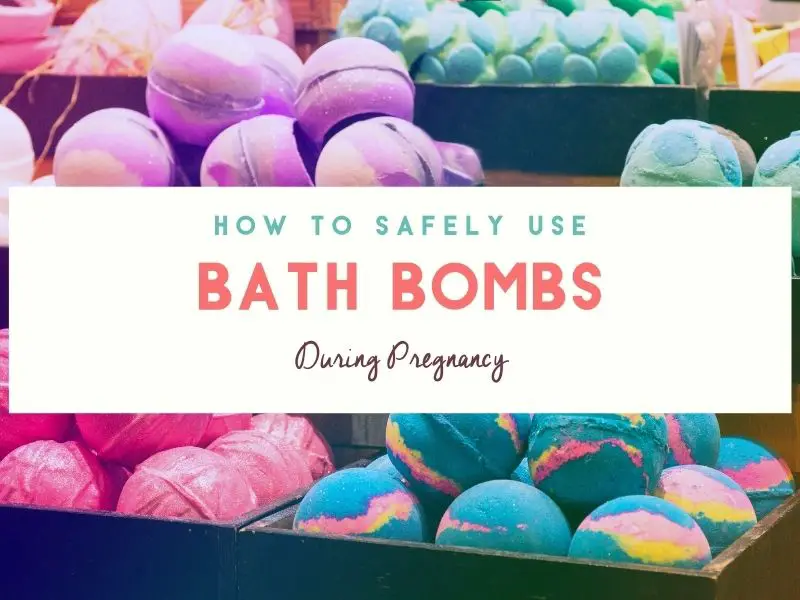Pregnancy is a physically demanding time, and moms are often eager to find safe ways to relax their muscles and mind. Soothing baths are of course one of the most obvious choices but as reported in the International Journal of Environmental Research and Public Health, there’s evidence that pregnant women modulate their use of cosmetics during pregnancy due to perceived risks. This can mean that moms-to-be may be worried about using bath products to help them relax.
So, what are the risks inherent in your beloved bath relaxation products? In this article, we’ll take a close look at bath bombs so you can protect yourself and your baby from unnecessary risk.
Are Bath Bombs Safe During Pregnancy?
So, are bath bombs safe to use during pregnancy? Yes! The majority of bath bombs use pregnancy-safe ingredients. However, that doesn’t mean EVERY bath bomb is made from ONLY pregnancy-safe ingredients, and so the key to using bath bombs safely during pregnancy is knowing which ingredients are considered safe are which are not.
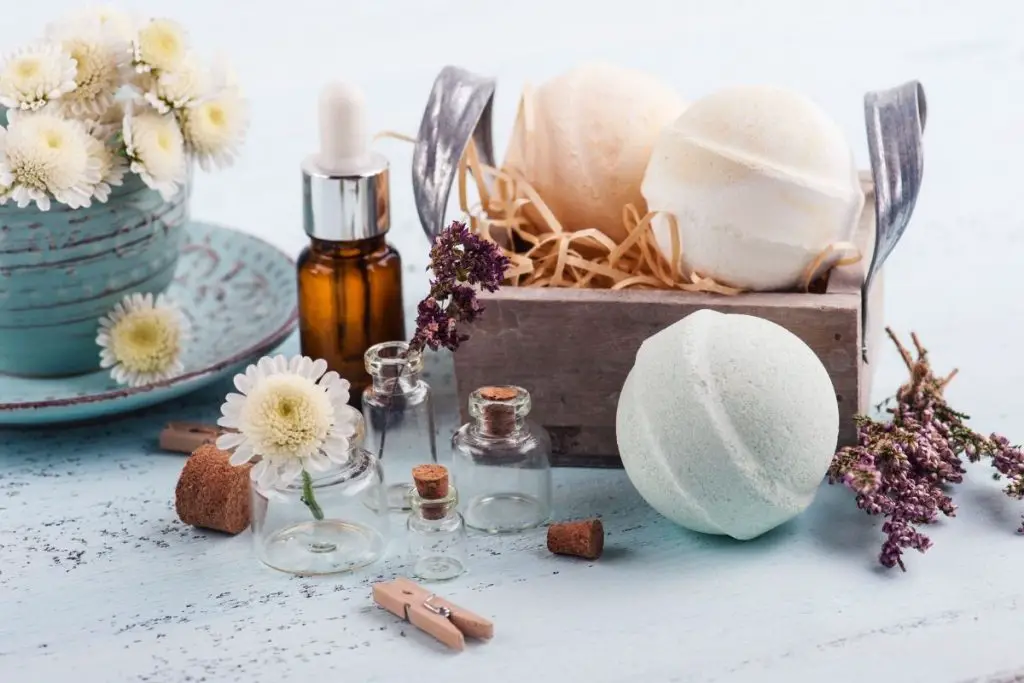
Safe Bath Bomb Ingredients
Sodium bicarbonate and citric acid are the main ingredients in bath bombs. Neither of these ingredients pose a risk during pregnancy.
The FDA places both sodium bicarbonate and citric acid within the pregnancy category C, referring to their internal use and not to their topical use; meaning they’re considered ok to ingest , and therefore should be find to put in your bath.
When the safety of bath products is raised, it’s the added fragrances that are often the issue, and there’s an element of truth in that. To use any bath product safely during pregnancy you should have a look through the ingredients list and check that the fragrances used are considered safe.
You’ll find two types of fragrances on any given ingredients list: essential oils and synthetic fragrances. Each of these carries very different levels of risk, so let’s take a look at each.
Essential Oils
The International Federation of Professional Aromatherapists offers some guidance and reassurance by way of a comprehensive list of safe essential oils, along with the key essential oils to avoid during pregnancy. (Christie. L. et.al. 2020)
Happily, bath bomb favorites such as citrus, lavender, neroli, rose and ylang-ylang are all on their “safe” essential oil list.
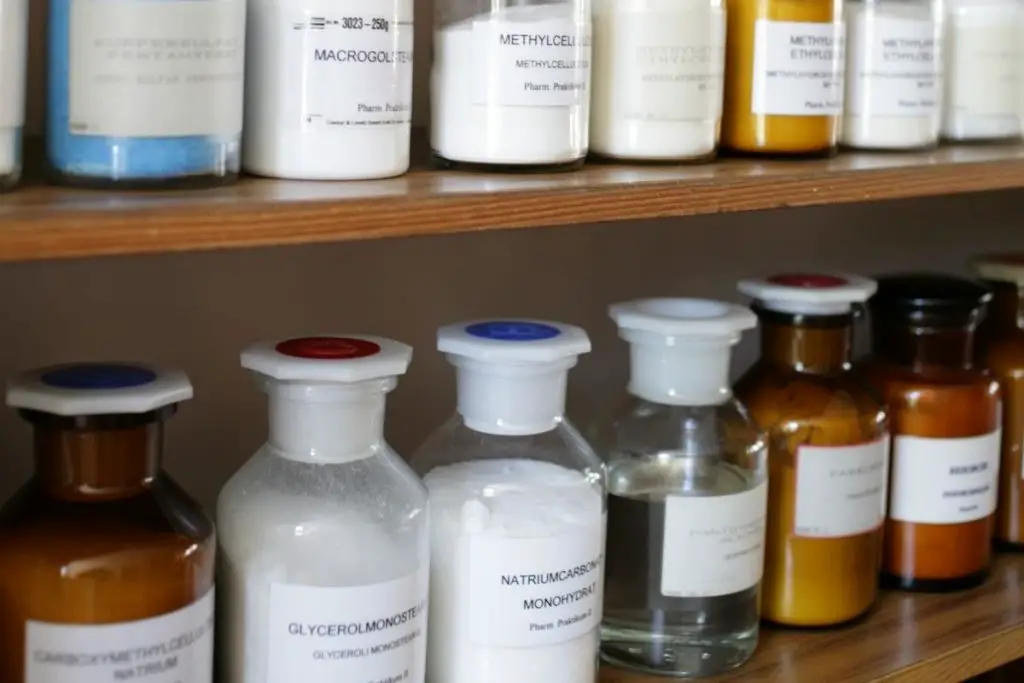
Synthetic Fregrances
Unless otherwise stated, any fragrance oil (as opposed to an essential oil) used in bath products like bubble baths, Epsom salts, and bath bombs are synthetic products, and if you’re the cautious type, you may wish to avoid such ingredients for the reasons below.
Firstly, as this review from Environmental Health Perspectives indicates, chemicals commonly present in synthetic fragrance oils, such as benzaldehyde, benzyl acetate, benzyl alcohol, limonene and ethanol are all associated with unwanted irritation.
Synthetic Fregrances and Bacterial Vaginosis
Given that synthetic fragrances may cause unwanted skin and mucous membrane irritation and imbalance (especially for anyone with known sensitivities), a notable concern is their potential contribution to a common condition known as bacterial vaginosis.
Bacterial vaginosis is a common infection caused by an imbalance between good and bad bacteria within the vaginal bacterial colonies. This infection is more concerning during pregnancy as, if left untreated, it can lead to the migration of harmful bacteria up toward the uterus where it can cause pregnancy complications. To reduce the risk of bacterial vaginosis, sources such as the Otterbein University of Ohio suggest the avoidance of fragranced bubble baths and bath bombs. (Howard, M. 2020)
Does this mean that women with no history of bacterial vaginosis or skin sensitivities must only use products that are fragrance-free? No! By choosing products made using pregnancy-safe essential oils as an occasional bath time treat, you’re not likely to contribute significantly to the imbalances which can lead to bacterial vaginosis, especially when the product is diluted in a full bathtub of water.
Colorants
Another common ingredient found in bath bombs are colorants.
The use of colorants in such products falls under a country’s cosmetic safety regulations. Countries such as Canada, the US, Europe, and Australia all have robust regulations for the use of colorants, and so purchasing bath bombs manufactured in these countries is a good starting point.
Despite this level of regulation, however, looking for bath bombs made using natural colorants such as clays or botanical extracts may give you added peace of mind.
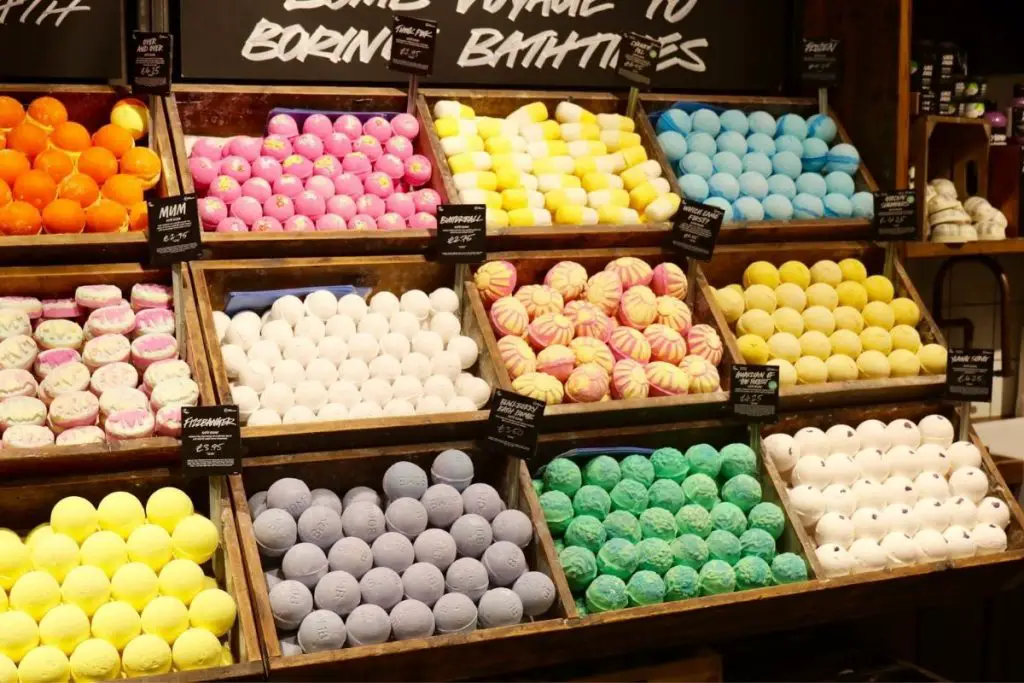
Are Lush Bath Bombs Safe to use During Pregnancy?
Popular thanks to their natural skincare ethos, Lush is an popular choice if you’re seeking out natural and less-chemical reliant products; but walking past a Lush store can sometimes be a punch in the face of scents, especially for sensitive pregnancy-noses.
Because of this contradiction, if you live near a Lush store, you’ve likely wondered if their bath bombs really are safe for pregnant women? Luckily, they are! Lush itself states that it classes all of its products, including bath bombs, as safe for use during pregnancy. Although often highly scented, their bath bombs can be considered safe because they’re formulated within the International Fragrance Association set of regulations, which promote the safe use of fragrances.
Synthetic Ingredients in Some Lush Products
There are some synthetic ingredients found within Lush bath bombs, which the company classes as “safe synthetics”. These are ingredients that must be regarded as synthetic since their creation often involves the manipulation of a natural ingredient within a lab.
Hoever, when researching the safety data of the safe synthetics used in Lush bath products, you’ll see that they were chosen thanks to solid research into their suitability for use on the skin. For example, the use of dipropyl glycol (a common ingredient in their bath bombs) was found to be safe in skincare preparations through research published in the International Journal of Toxicology.
Lush bath bombs are notoriously colorful, yet naturally derived colorants tend to produce more muted tones. So are the bright colorants used by Lush safe? Yes, many of Lush’s colorants are suitable for use in food products, hence their safety ratings are reassuringly high. They also class many of their colorants as “safe synthetics” and the company advises that it only chooses those which have been approved as safe by global governing bodies.
Iron oxide is, for example, a colorant that appears in a number of their bath bombs and this has been given a GRAS (generally recognized as safe) rating by the FDA.
Essential Oils Used in Lush Products
If we take a look at the ingredient list of Lush bath bombs, do we find that their essential oils fall in line with those approved by the International Federation of Professional Aromatherapists whilst avoiding those on the list they class as unsafe? Their “Deep Sleep” bomb, which is undoubtedly good news if you’re pregnant, contains essential oils of lavender, Roman chamomile, and neroli, which all reside within the safe list. Although some Lush bombs contain essential oils and absolutes (which are similar to essential oils) which don’t feature on the aforementioned safe list, they do not feature on the unsafe list and as you’ll recall, Lush works within the guidelines of the International Fragrance Association.
Skin Softening Ingredients in Lush Bath Products
Worthy of note is the fact that a number of Lush bath bombs contain additional skin softening and nourishing ingredients, such as plant butters and carrier oils.
A concern raised about bath bombs in general is their potential to irritate the skin and mucous membranes, and from a formulation standpoint the presence of these fatty ingredients in Lush bath bombs will help to reduce the risk of such irritation.
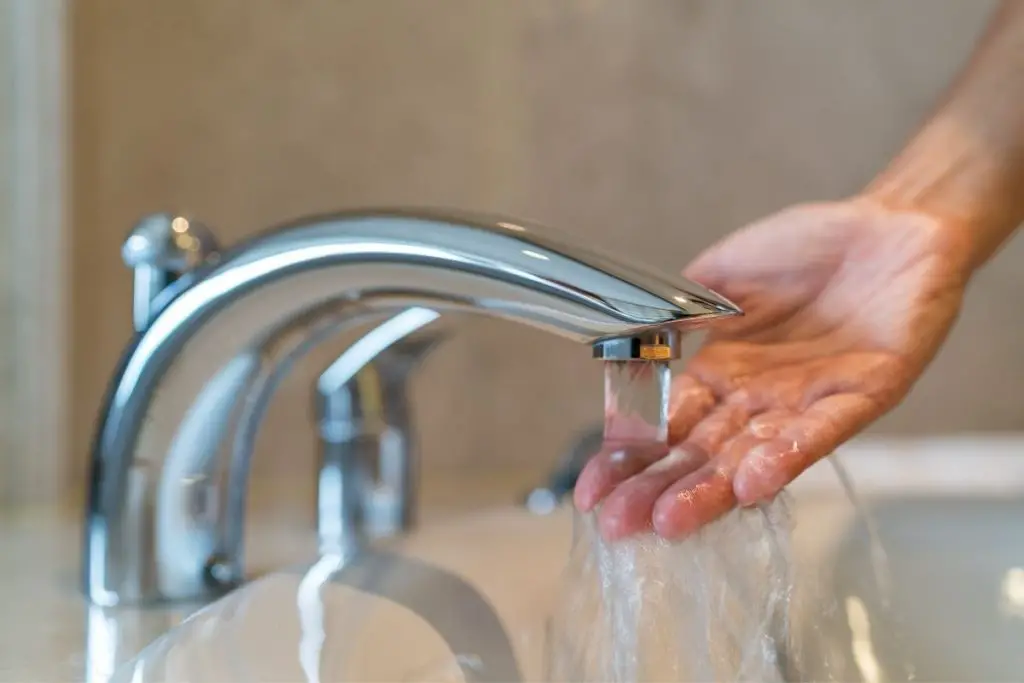
A Safe Water Temperature to Enjoy a Bath Bomb
Now that we know you can easily purchase bath bombs that are safe to use during pregnancy, we should talk about using those bath bombs once you get them home.
As we covered, bath bombs tend to be created using a base of sodium bicarbonate alongside citric acid and although the fizzing reaction between these alkaline and acidic ingredients will occur in cool water, the bubbling reaction is better when the bathwater is hot.
Unfortunately research suggests that it is in fact the temperature of your bathwater is what poses the greater potential risk to your health.
For many years, doctors and health experts have been warning against hot baths during pregnancy, and this advice still stands.
Thankfully, recent research has slightly altered our understanding of just how hot a bath can safely be.
Research published in the British Journal of Sports Medicine highlighted the importance of avoiding increases in core body temperature above 39 degrees Celsius (102.2 Fahrenheit) when pregnant, due to a risk of fetal harm. But their research has now revealed that pregnant mothers can safely soak up to twenty minutes in a 70 degrees Celsius bath (158 Fahrenheit) without exceeding this core temperature “danger zone”.
So while you can have a bit more heat than was once thought, do make sure to keep your bath within the safe zone, even if it may mean less fizzing.

Benefits of Bath Bombs for Pregnant Women
I hope this article has assured you that, when carefully chosen and used at an acceptable temperature, bath bombs are fine to use during pregnancy and their occasional use can be beneficial. A soak in an attractive and beautifully scented tub can be used as an act of self-care and as a tool for relaxation.
Don’t underestimate the importance of healthy relaxation!
The impact of stress on a woman’s pregnancy is an important field of research. As detailed in the Current Opinion in Psychiatry, stress is linked to adverse pregnancy outcomes, and therefore interventions to alleviate stress are wholly beneficial during pregnancy.
Furthermore, bath bombs that have relaxing and pregnancy-safe essential aromatherapy oils such as lavender, sandalwood, neroli or Roman chamomile, have added benefits.
Research, like this 2010 study published in the Journal of Nara Medical Association, has shown that using aromatherapy in acts of self-care during pregnancy, can reduce anxiety and provide relaxation over the long term during pregnancy.
So, if you are one of the many who find bathing to be a deeply relaxing experience you can absolutely use a nice bath bomb to help safely manage your stress levels.
References
Cécile, M., Cabut, S., & Vendittelli F. (2016). Changes in Cosmetics Use during Pregnancy and Risk Perception by Women. International Journal of Environmental Research and Public Health,13(4), 383. https://www.ncbi.nlm.nih.gov/pmc/articles/PMC4847045/
Christie. L., et.al. (2020). Pregnancy Guidelines: Guidelines for Aromatherapists working with pregnant
clients. International Federation of Professional Aromatherapists. https://ifparoma.org/wp-content/uploads/2020/03/Pregnancy-guidelines-1.pdf
Fiume, M.M., et. al. (2012). Safety Assessment of Propylene Glycol, Tripropylene Glycol, and PPGs as Used in Cosmetics. International Journal of Toxicology. 31(5), 245S-260S. https://journals.sagepub.com/doi/10.1177/1091581812461381
Howard, M., (2020). Bacterial Vaginosis. Nursing Student Class Projects (Formerly MSN). 450.
https://digitalcommons.otterbein.edu/stu_msn/450
Igarashi, T., & Fujita, M. (2010). Effects Of Aromatherapy For Self-care During Pregnancy. Journal of Nara Medical Association. 61 (3-4), 101-112. http://hdl.handle.net/10564/1199
Ravanelli, N., et. al. (2019). Heat stress and fetal risk. Environmental limits for exercise and passive heat stress during pregnancy: a systematic review with best evidence synthesis. British Journal of Sports Medicine. 53(13). thttps://bjsm.bmj.com/content/53/13/799.abstract
Schetter, C.D., & Tanner, L., (2015). Anxiety, depression and stress in pregnancy: implications for mothers, children, research, and practice. Current Opinion in Psychiatry. 25(2). 141–148. https://www.ncbi.nlm.nih.gov/pmc/articles/PMC4447112/
Scents and Sensitivity. (1998). Environmental Health Perspectives. 106 (12). A594-A599. https://ehp.niehs.nih.gov/doi/pdf/10.1289/ehp.98106a594
